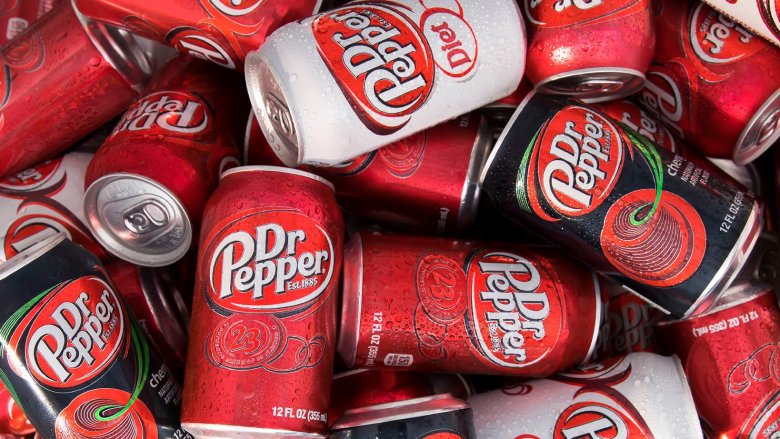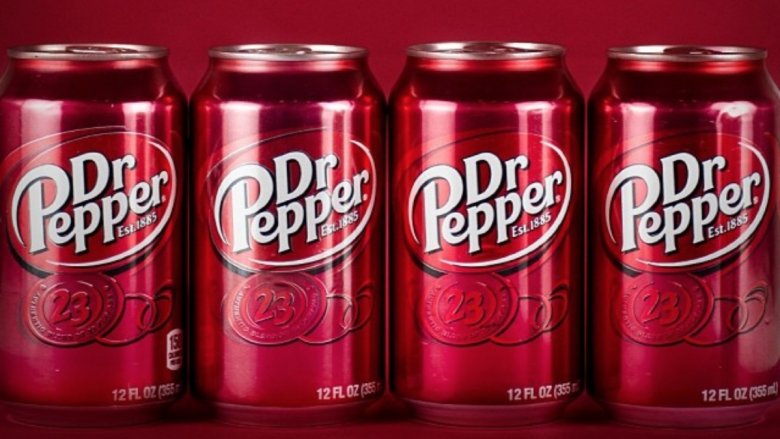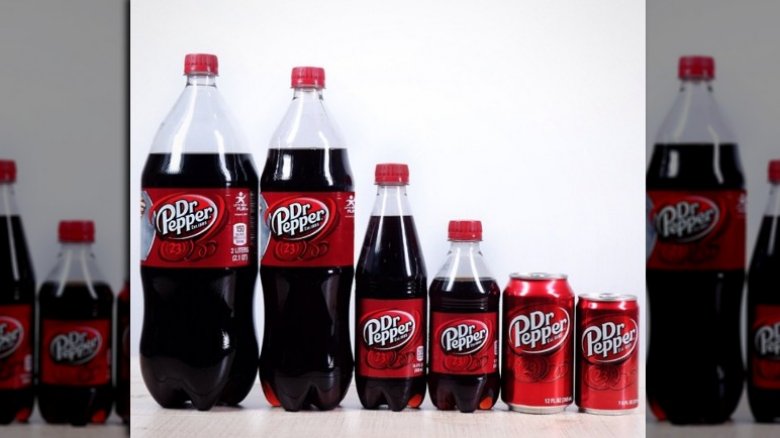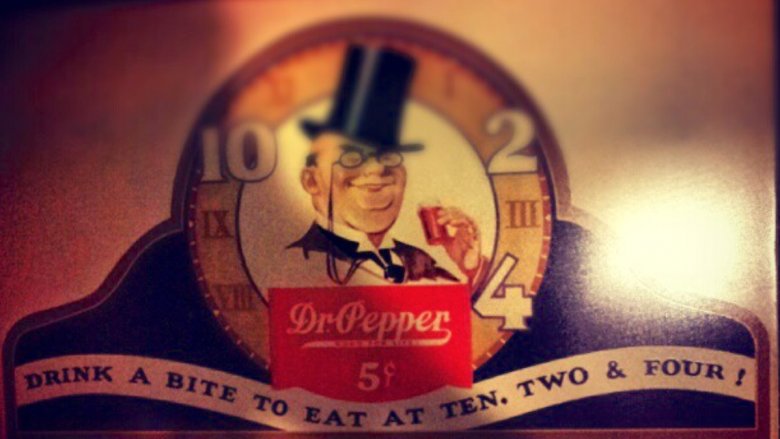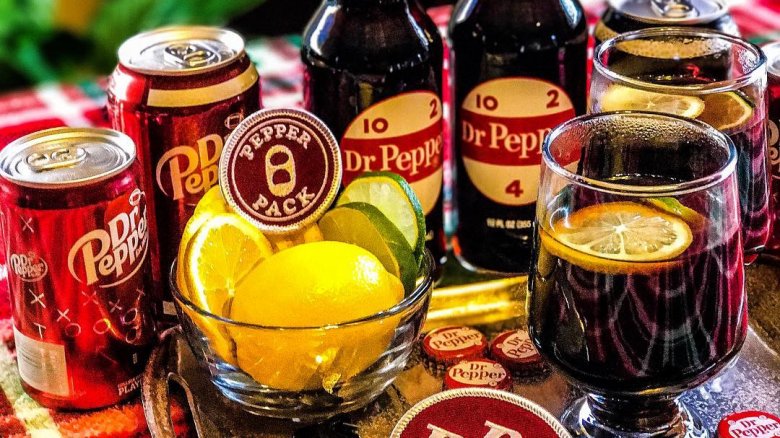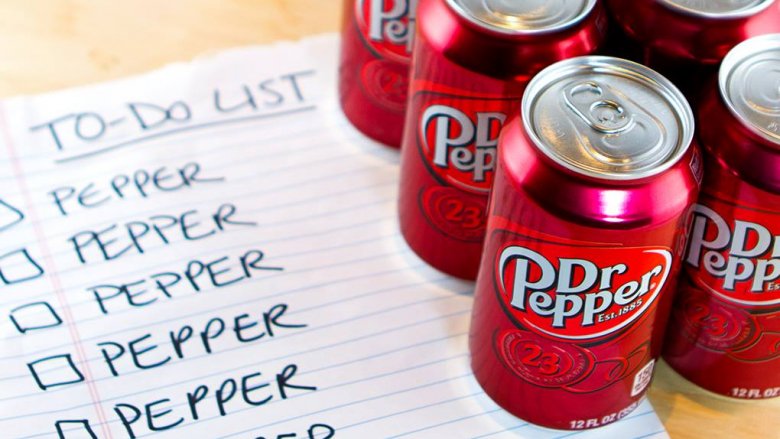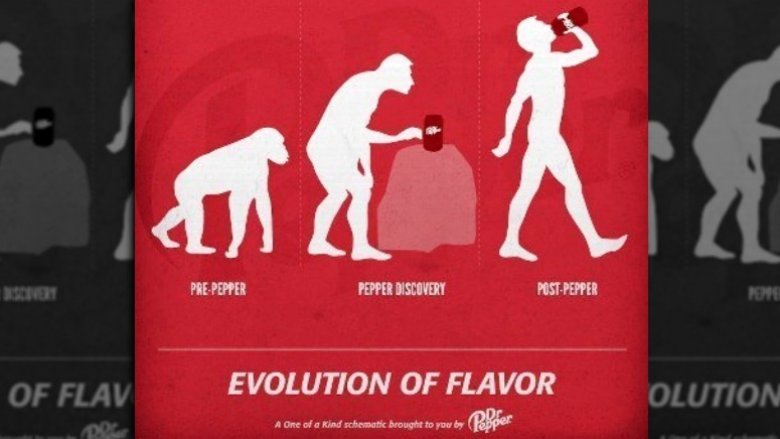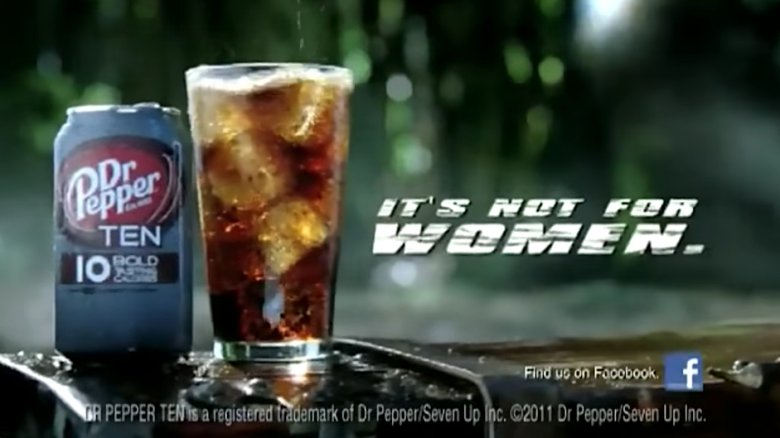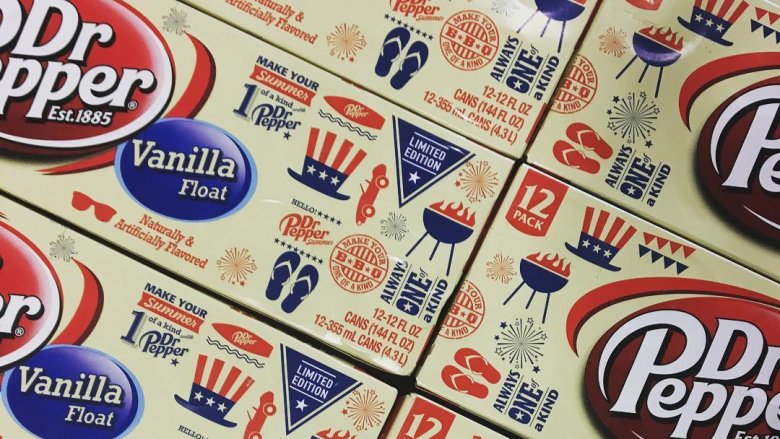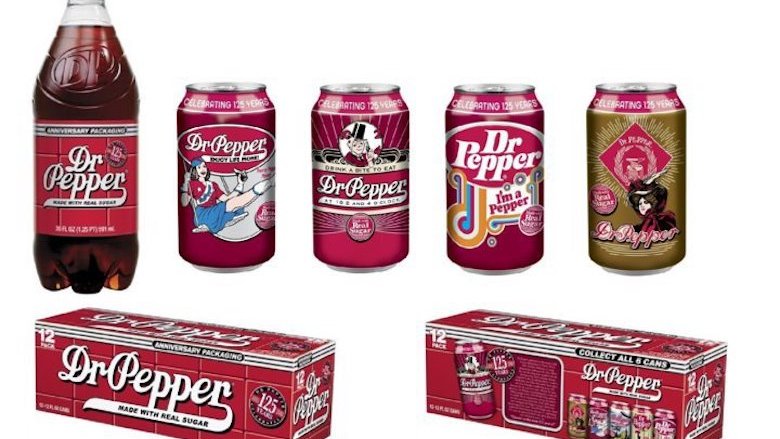The Untold Truth Of Dr Pepper
Any standard soda fountain is going to have your classic colas and lemon-lime options, but no soda machine is complete without what is arguably the most unique soft drink of all time — Dr Pepper. 7-Up might have called itself "The Uncola," but with a flavor that's nearly impossible to pinpoint, Dr Pepper (which was once astutely branded with the slogan "Always One of a Kind") could have conceivably called itself the uncola, too. What is that flavor? Is it really prune juice?
One thing's for sure — it's not Coke, and that's according to a federal court who ruled that its oh-so-unique flavor meant it was decidedly not a "cola product." So what is it, exactly? We will probably never know the secret recipe of the the oldest major soft drink in the United States, but Dr Pepper has been around since 1885, and in all that time you can bet there are some secrets of the brand that have been divulged.
Does it have prune juice or what?
There has long been speculation that one of the secret ingredients in Dr Pepper is prune juice, and really, it's as good a guess as any when it comes to discerning exactly what that flavor is.
According to Snopes, the myth has persisted since about 1930, and though it's unclear exactly where it originated, common thought is that a competitor's deliveryman started the rumor in an attempt to dissuade store owners from stocking the rival soft drink. If true, it was actually a smart move — given all the unpleasant side effects associated with it, most people don't want to drink prune juice. Soda masquerading as a carbonated laxative of sorts? No thanks.
So... does Dr Pepper really contain prune juice? It doesn't take a whole lot of research to dispel this pesky rumor — the company's own website plainly states that "Dr Pepper is a unique blend of natural and artificial flavors; it does not contain prune juice." Case closed.
So what is it made of?
In an advertisement from the 1960s, Dr Pepper entices the reader with its one-of-a-kind flavor, saying, "Dr Pepper is not a cola, not a root beer, not a fruit flavor. It is a cunning blend of many flavors... with zip and tingle and refreshing and words like that." So what is it, already?
The company has never divulged any of the ingredients that make up its proprietary recipe — other than confirming that prune juice is not, in fact, one of them — but they have revealed that the formula contains "a unique blend of 23 flavors." That blend is the creation of Charles Alderton, a pharmacist at Morrison's Old Corner Drug Store in Waco, Texas, who in 1885 set out to make a soda syrup that tasted the way the store smelled. He kept notes of his concoctions in a journal, and after many experiments, he landed on the flavor we know and love today. If only we could get our hands on that journal...
Is this the secret recipe?
The formula for Dr Pepper is such a tightly guarded secret that only three people are privy to the information, and the company has even allegedly gone so far as to split the recipe in half for storage in safe deposit boxes at two different banks to ensure its security. But what about that journal of Dr Pepper creator Charles Alderson — the one that contained the original recipe?
In 2009, an old ledger from Morrison's Old Corner Drug containing a formula for Dr Peppers Pepsin Bitters was discovered in a Texas antique store. Among the almost impossible-to-read ingredients are wahoo bark, bitter orange peel, mandrake root, sweet flag root, syrup, and glycerin, and though Dr Pepper Snapple Group did not dispute the authenticity of the ledger itself, the company said that the recipe bore no semblance to any Dr Pepper formula, and that mixing those ingredients together would result in nothing close to the soft drink's flavor. And so the search goes on...
What the heck is Hot Dr Pepper?
Hot soda sounds about as appealing as warm Champagne, but nevertheless, Hot Dr Pepper has been around since the 1960s, created in an attempt to keep soda sales strong during the colder months. But what the heck is it?
According to the company's website, "Hot Dr Pepper was developed many years ago as a refreshing winter drink. Heat Dr Pepper in a saucepan to 180 degrees, place a thin slice of lemon in the bottom of a coffee mug or insulated cup and pour the heated Dr Pepper over the lemon." Okay... but does it taste good?
Jed Portman of Serious Eats writes that heating the soda transforms it into something like a "thick, sweet tea," that really isn't so different from hot cider. "I can't guarantee that you'll fall in love with Hot Dr. Pepper, but I'll tell you this it's going to be better than you think," he concludes. Not exactly a rave review, but it might hit the spot on a cold day. Maybe add a shot of whiskey for good measure?
It might be the fountain of youth
Forget real doctors — when Elizabeth Sullivan turned 104 years old, she told CBS DFW that the doctor she turns to is none other than Dr Pepper. "People try to give me coffee for breakfast. Well, I'd rather have a Dr Pepper," she said. "I started drinking them about 40 years ago. Three a day. Every doctor that sees me says they'll kill you, but they die and I don't. So there must be a mistake somewhere." To mark the occasion, the soft drink company sent Sullivan a cake shaped like — what else? — a bottle of Dr Pepper.
So is Dr Pepper really the fountain of youth? Not exactly, says one doctor, coincidentally named Dr. Ginnette Pepper. "For some of these ingredients [in the soda], there is well-known evidence that they may have deleterious effects on lifespan, particularly with excessive use," Pepper said. "There is some evidence for health benefits of moderate caffeine intake for some people." Apparently for Elizabeth Sullivan, those benefits were huge.
They made Christians mad
A Facebook ad illustrating Dr Pepper's supposed effect on evolution riled a group of Christians as it challenged their belief in creationism. The ad, a play on the iconic depiction in the 1965 March of Progress graphic, claims that we have Dr Pepper to thank for our evolution to modern man. While obviously a joke, it nevertheless angered some Christians. Typical comments to the Facebook post included responses like, "I ain't no freaking chimp. No more Dr Pepper for my household," and "I love Dr Pepper but hate this photo. Forget evolution... Jesus all the way!"
Others were less offended by the post, and Today reported that 80 percent of 20,000 readers polled said they weren't bothered. "Extreme liberals complain about things such as a reference to 'God' on our coins and extreme conservatives complain about things such as a Dr Pepper ad depicting evolution... Most sensible people aren't too concerned about either," one reader wrote to the site.
Like it or not, it sure got people talking about the brand — the post garnered over 140,000 likes and more than 900 comments.
They made a soft drink "not for women"
In an attempt to attract men to their lower calorie Dr Pepper Ten, the company launched an ad campaign that labelled the soft drink "not for women." Why isn't it for women, you ask? Because it contains a handful of calories and sugar, unlike your usual zero calorie "girly" diet soda. Along with the questionable slogan, an equally questionable commercial was released, complete with a man in an action movie setting asking women, "Hey ladies. Enjoying the film? Of course not. Because this is our movie and this is our soda. You can keep the romantic comedies and lady drinks. We're good." Alrighty then.
While a Dr Pepper vice president insisted that "women get the joke," it's hard to argue that the campaign wasn't sexist, and it raised the ire of women across media. Jill Pantozzi of The Mary Sue wrote, "Next time Dr Pepper, just put genitals on all your beverages, that way we'll know which ones are ok to drink."
Satire or not, the slogan didn't stick, and today the soda is marketed (gender neutrally) as "10 bold-tasting calories with the same authentic 23 flavors of Dr Pepper. That's a whole lot of taste in one can."
They omitted "under God"
Dr Pepper's attempt at a patriotic ad campaign in 2001 drew the ire of those who took exception to an omission of certain words from the Pledge of Allegiance. According to the company, the limited edition cans featured the Statue of Liberty along with select words from the Pledge in an attempt to "...show support for the patriotic fervor that has been sweeping America since the tragic events of Sept. 11, 2001, and to show the world that we are a united nation of people who place a high value upon freedom." The problem, according to those upset, was the words used were, "One nation... indivisible," rather than the full phrase, "One nation under God, indivisible."
Dr Pepper was accused of being "too politically correct," and angry consumers called for a boycott. But the company explained it was purely lack of space, and not a malicious omission, saying, "Due to space limitations on the can, only a few of the 31 words from the Pledge of Allegiance could be used.... More than 90 percent were not included." They concluded that it was a "resoundingly patriotic, bipartisan message that we are a united nation," and did not pull the cans from shelves.
It wasn't always called Dr Pepper
We've always known it as Dr Pepper, but the beloved soft drink wasn't always referred to as such. When Charles Alderton created the drink in a Waco, Texas drugstore he didn't give it a name, prompting customers to simply order a "Waco." As the soda gained popularity, store owner Wade Morrison realized it needed a proper name, and coined it Dr. Pepper. It's said that the name of the drink was a nod to his lost love, the daughter of Dr. Charles Pepper, with whom he had previously worked. However, a look back at the timeline suggests Dr. Pepper's daughter would have been only 8 years old at the time, casting doubt on the story. According to the Dr Pepper Museum website, dozens on theories have been collected over time, but the true origin of the name is unknown.
What is known is that Dr. Pepper became Dr Pepper (no period) in the '50s, due to the logo's illegibility. The period caused consumers to read the name as "DriPepper," and was removed to lessen the confusion.
